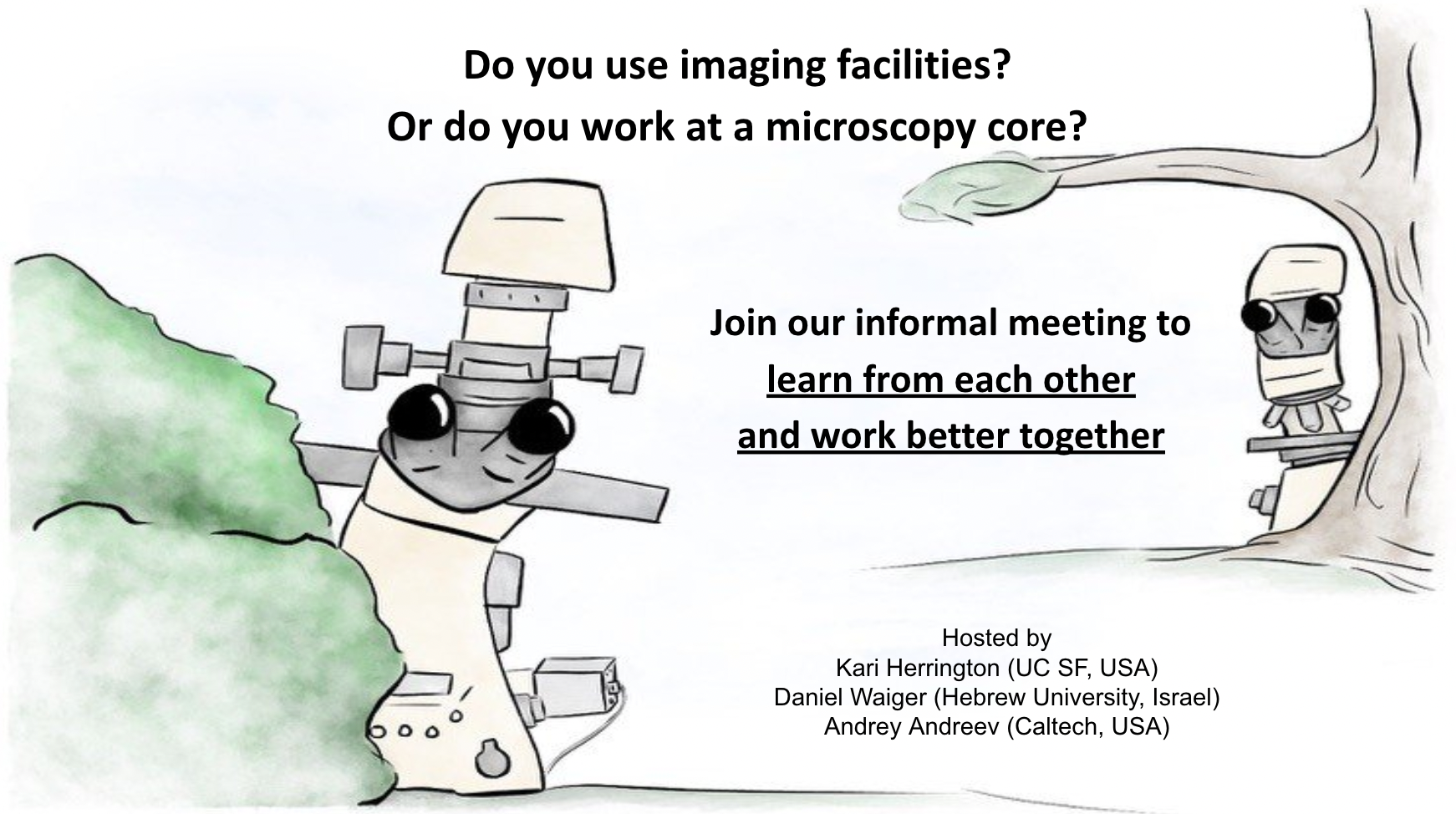International Informal
Microscopy Hour
Do you use imaging facilities or work at a microscopy core, or just really like microscopy (of any kind)?
Join us for a casual meeting about your microscopy experience and maybe some cool methods you use daily and wish more people knew about.
The main goal of this meeting is to have fun, while talking about microscopy and related topics :)
Next meeting:
To be announced...
To be updated and help us design productive conversation, please fill the survey: forms.gle/HjePfoAckzP8tD4H8
Organizers:
Kari Herrington (UCSF, USA)
Daniel Waiger (Hebrew University, Israel)
Andrey Andreev (Caltech, USA)

Notes from previous meetings:
February 14th, 2023
- getting started at working at the core - comparing custom and commercial systems - data using USB drives vs writing directly to network storage - how writing data via network can corrupt your experiment data - compression through JetRaw - running fiber/copper in the walls - custom scopes: photodamage becomes a thing to consider as experiments get more complicated - using automatic scripts to delete data after 30 days helps users' morale - use TreeView software to get overview of where data is save - analog for mac os: Disk Inventory X - managing Windows, e.g. setting up PageFile size way below RAM - PCIe NVMe storage for users who need 100fps / up to 2GB/s for fast acquisition - buying servers: ask for academic discount - aging of hardware/computers: things can run for 10-12 years with no issues; beware plastic parts that wear out - long-living policies that work well - a lot of necessary "service" is de-oiling and de-dusting - replacing gears / parts using 3D printing or CNC? - finding replacemenet/repair after-market service - Wheeling and dealing purchasing, quotes, and vendors
December 15th, 2022
After short presentations we got to covering topics: - why do you like/wanted to work at a microscopy core? - what is required to "get into microscopy?" - what knowledge/skills make biologists' life easier in microscopy? - shorting the loop between acquisition and analysis - math is not scary - image is a bunch of numbers, not "a picture" - users care about numbers and data, not about light rays and optics (that is what microscopists/builders care about) - data management. Compressing images into JPG and deleting originals to save space... - calculating required data before experiments start - learnign materials: link.springer.com/book/10.1007/978-3-030-22386-1 and iBiology digital iamge analysis - Imaging ONEWORLD looking for co-organisers: rms.org.uk/events/imaging-oneworld-series.html - data management: local infra and users' behavior is often the bottleneck - some data that never will be analyzed/used, shift responsibility for data & analysis on users/biologists because its only fair way - work in facilities: how does the job splits between servicing (scopes&users), building custom stuff, analysis, teaching... - how facilities differ based on size/loc - growing in facility; difference between custom and comm - types of facility users and how to help them - work in industry vs work in academia; freedom etc - facility size & impact magnitude; microscopists can have real impact by spending not that much time, especially in smaller facilities - interviewing for a job in facility: talk to managers AND users - best advice for microscopy newbies: ask the technician! - basic reading: consult with colleagues, read papers specific to your sample, Lakowicz - regular plug of image.sc for image analysis and microlist.org for everything - "art of keeping data honest" and bitesizebio.com/30308/quantify-images-unbiased-way/ and embopress.org/doi/full/10.15252/embj.2020105889 - expansion microscopy (suddenly :) - image analysis is extension of biology experiment; honest microscopy is keeping imaging params the same, and varying single param in biology
September 14th, 2022
- @ReynaudEmmanuel reminds us about "metrology suitcase"; slide from @BioimagingNA - trusting hardware & doubting old hardware - piezo stages (and issues thereof) - talking to microscopy companies efficiently - grants & service contracts - data management / transfer - onboarding new users to light-sheet - core director's role - helping users start (use smallest FOV / sample), troubleshoot samples - getting info from paper vs from the authors directly - how to get software part of paper working - clearing protocols - spilled (clearing) chemicals and smells - how to manage expectations of PI about the experiments - FRET, 2P-FRET & FLIM-FRET - consulting first-timers: really need to collaborate on definition of project, goals, pick methods. Core is not "plug-and-play' - CZI funding feel in the need for custom but user-friendly systems - onboarding users on custom setups - development of commercial system